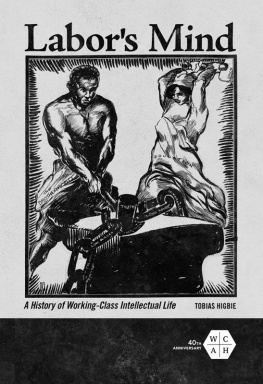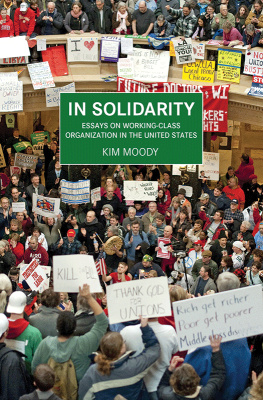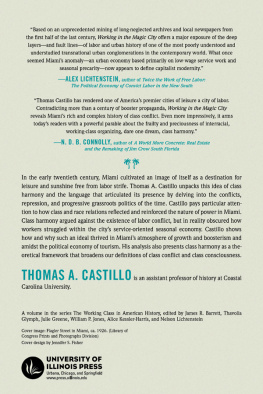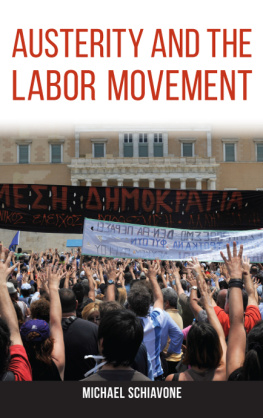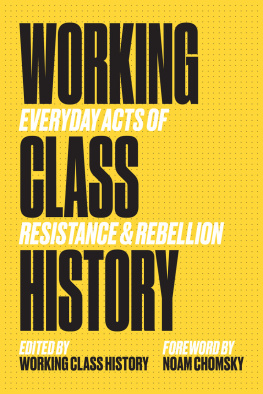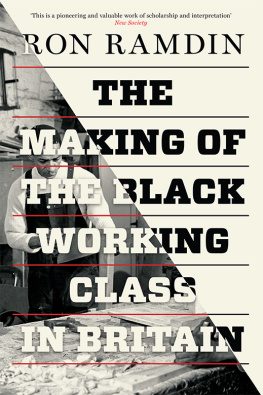Labors Mind
The Working Class in American History
Editorial Advisors
James R. Barrett, Julie Greene,
William P. Jones, Alice Kessler-Harris,
and Nelson Lichtenstein
A list of books in the series appears at the end of this book.
Labors Mind
A History of Working-Class
Intellectual Life
TOBIAS HIGBIE
2019 by the Board of Trustees
of the University of Illinois
All rights reserved
Library of Congress Cataloging-in-Publication Data
Names: Higbie, Frank Tobias, author.
Title: Labors mind : a history of working-class intellectual life / Tobias Higbie.
Description: Urbana : University of Illinois Press, [2019] | Series: The working class in American history | Includes bibliographical references and index.
Identifiers: LCCN 2018029189| ISBN 9780252042263 (hardcover : alk. paper) | ISBN 9780252084027 (pbk. : alk. paper)
Subjects: LCSH : Working classUnited StatesIntellectual life. | Working classEducationUnited States. | Labor movementUnited StatesHistory20th century. | United StatesIntellectual life20th century.
Classification: LCC HD 8072 . H 65 2019 | DDC 305.5/620973dc23 LC record available at https://lccn.loc.gov/2018029189
E-book ISBN 978-0-252-05109-8
For my children
There are many roads to freedom
Contents
Acknowledgments
The city of Chicago is responsible, in many ways, for this book. Early in my career, I had the great fortune to work at the Newberry Library, where the papers of the Dill Pickle Club, Jack Conroy, and the Charles H. Kerr Publishing Company sparked my curiosity about the citys working-class public sphereas did the dramatic street protests around the time of the second Gulf War. The result was an exhibition, Outspoken: Chicagos Free Speech Tradition , co-curated with Peter Alter of the Chicago Historical Society and assisted by Jennifer Koslow (now at Florida State University) and Ginger Shulick Porcella (now at the Tucson Museum of Contemporary Art). Over the years, others at the Newberry have continued to support the project in various ways, especially Jim Grossman (now at the American Historical Association), Paul Gehle, Martha Briggs, Doug Knox, and Liesl Olsen. The late Franklin Rosemont, radical historian, collector, and publisher, deserves credit for keeping this history of Chicago bohemia alive, maintaining the Kerr Publishing Company, and preserving a rich collection of radical pamphlets and ephemera.
My own engagement with the contemporary labor movement has been another touchstone for this project. The decade-long campaign to win collective bargaining rights for graduate employees at the University of Illinois was my first introduction to social movement education and the beginning of an ongoing conversation about practical democracy among comrades who are now old friends. Later I worked at the University of Illinois Labor Education Program, where I encountered remarkable worker-students in the United Steelworkers of America summer institutes, the International Brotherhood of Electrical Workers apprenticeship school, and in other settings. I especially want to thank my Illinois colleagues Joe Berry, Helena Worthen, Ed Hertenstein, and Bob Bruno. Stories I heard from two veterans of the labor movement didnt make it into the book, but on reflection they inspired much of my research. The late Les Orear, longtime champion of the Illinois Labor History Society, recounted his experiences as a student at the University of Wisconsin, and as an organizer of packinghouse workers during the Great Depression. Ed Sadlowski, former head of the United Steelworkers in Chicago, told me about his youthful love of story magazines and about a worker in the U.S. Steel plant who introduced him to the work of James T. Farrell. Observing firsthand the vibrant program of the UCLA Labor Center and the Institute for Research on Labor and Employment has been another inspiration for this project, and I especially want to thank Kent Wong, Gaspar Rivera Salgado, Janna Shadduck-Hernandez, and Victor Narro for the amazing work they do to keep alive the best traditions of the labor movement.
No scholarly work leaps fully formed from the head of its author. We share drafts and comments and encourage and redirect one another. This is especially so with long-germinating projects like this one. Years after I moved away from Chicago, I was honored to spend a year back at the Newberry as the Lloyd Lewis Fellow in American History. The outstanding collections enriched my story, and I benefited from the support of outstanding librarians and a community of scholars with their noses to the grindstone. The participants in the Newberrys Labor History Seminar provided critical encouragement, especially Leon Fink, Erik Gellman, James Schmidt, Rosemary Feurer, Elliott Gorn, and many others. Among my class of fellows, I especially want to thank Cristina Stanciu, Cathleen Cahill, and Mary Campbell for their detailed comments. Beyond the Newberry, many others read, commented, and urged me to finish the damn thing, including Elizabeth Faue, Scott Nelson, Kathryn Oberdeck, Cindy Hahamovitch, Nelson Lichtenstein, Adam Nelson, John Rudolph, Tony Michels, Caroline Merithew, Tim Lacy, Steve Meyer, Ron Schatz, and Emily LaBarbera Twarog. My colleagues in Los Angeles, including John Laslett, Jan Reiff, Karen Brodkin, Jennifer Luff, Kelly Lytle-Hernandez, Vinay Lal, Ellen DuBois, Nile Green, Michael Meranze, and Ruth Milkman have provided invaluable support and feedback on this project. Finally, I want to thank Jim and Jenny Barrett for their support, friendship, and good humor for over twenty-five years. Jims accessible scholarship and his dedication to his students continue to inspire me. I also want to thank two anonymous readers from the University of Illinois Press for invaluable feedback drafts of the manuscript.
as a revised version of Why Do Robots Rebel? The Labor History of a Cultural Icon, Labor: Studies in Working Class History of the Americas 10 (Spring 2013). I thank the editors and publishers of these pieces for their permission to build on my earlier works. I also want to thank the small army of editors and library and production staff that helped assemble the final product. At the Newberry, John Powell helped me with images. At the University of Illinois Press, James Engelhardt, Laurie Matheson, and the production staff helped me get over the finish line. Pauline Lewis from UCLA provided invaluable research and editing support for the final product.
When a project is so long in development, births, deaths, and everything in between are the unseen companions of an authors words. My parents, Peter and Frances Higbie, both passed away in the years this book germinated, as did my mother-in-law, Sharon Gaffney. We miss them every day. My children were born near the beginning of this project and now are beginning their run as teenagers. They would like me to write something of interest to them now, preferably fiction. We will see about that. Through it all, my lifelong companion, Loretta Gaffney, has cheered me on to the finish line. Together, we are spanning time.
Introduction
In the depths of the Great Depression, a youthful Ralph Ellison had an un-expected encounter with intelligence and high culture that stuck with him for decades. The recent college graduate and future novelist was supporting his bud-ding literary career on the staff of the New York Writers Project and dabbling in progressive politics. Canvassing Harlem tenement buildings with a petition for some long-forgotten cause, Ellison knocked on each apartment door asking for signatures. As he stood at the door of a basement apartment, he heard the voices of men arguing in accents he thought marked them as unschooled African American migrants from the rural South. Behind the door, a mystery was unfolding, Ellison remembered, a mystery so incongruous, outrageous, and surreal that it struck me as a threat to my sense of rational order. The men, cursing and shouting, were locked in verbal combat over which of two celebrated Metropolitan Opera divas was the superior soprano!

